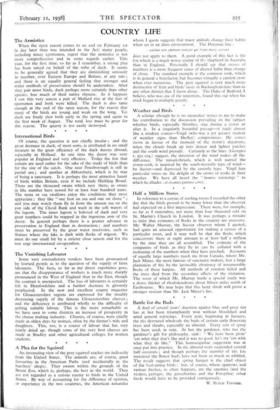A Plea for the Squirrel An interesting view of the
grey squirrel reaches me indirectly from the United States. The animals are, of course, great favourites in the American Parks (and incidentally in the butchers' shops). They swarm within the grounds of the Bronx Zoo, which is, perhaps, the best in the world. They are not regarded as a serious enemy to birds in the United States. By way of accounting for the difference of opinion, or experience in the two countries, the American naturalist
whom I quote suggests that many animals change their habits when set in an alien environment. The Horatian line : . caelum non aximum mutant qui trans mare currunt does not apply to them. A good example of this fact is the fox which is a much worse enemy of th: shepherd in Australia than in England. Personally I should say that excess of numbers is a more frequent cause of altered habit than change of clime. The standard example is the common rook, which is in general a benefactor, but becomes virtually a carrion crow when over numerous. The grey squirrel is very much more destructive of fruit and birds' nests in Buckinghamshire than in any other district that I know about. The Duke of Bedford, I believe, who was one of the importers, found this out when his stock began to multiply greatly.


















































 Previous page
Previous page